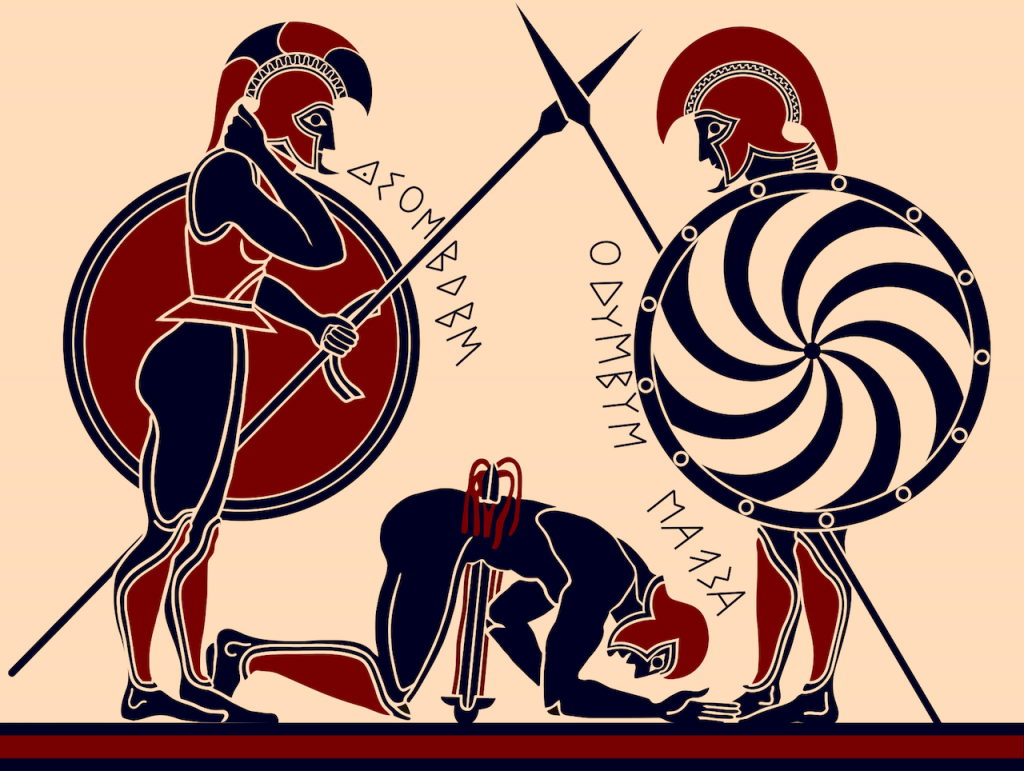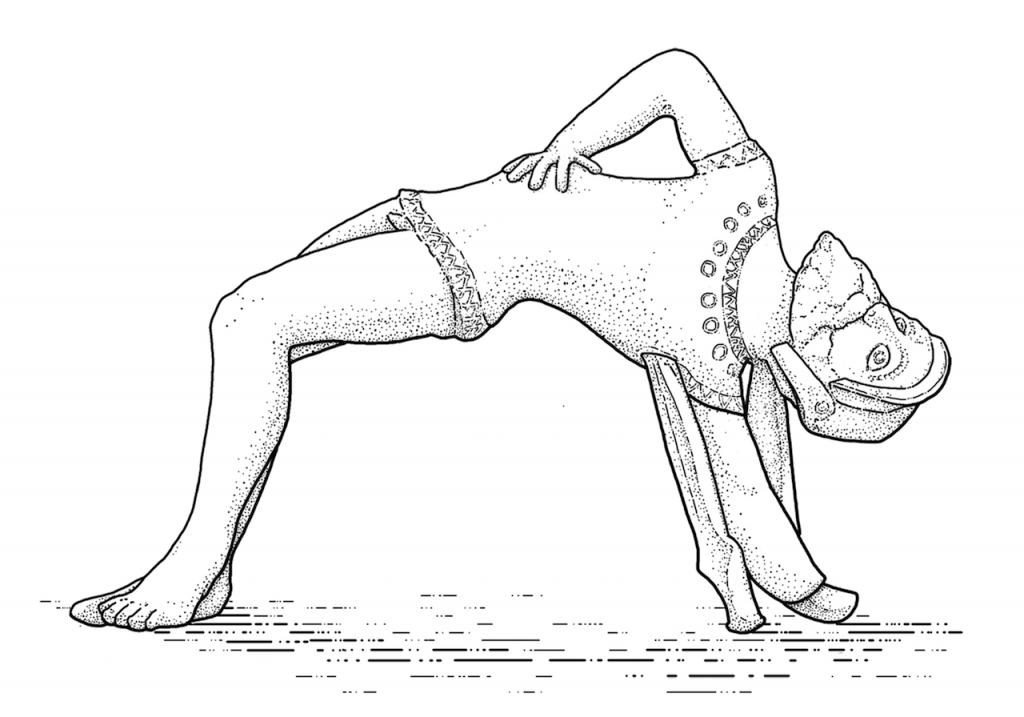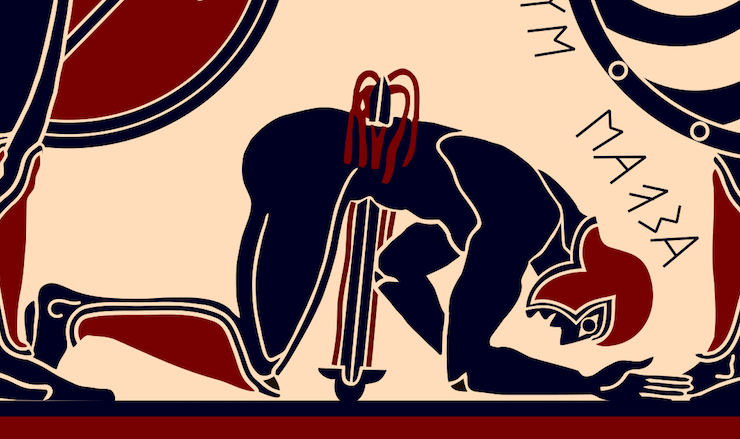2017.09.28 | By Gregory Nagy
Pindar’s Nemean 7 is to me one of his most exquisite compositions. For literary critics, however, the compactness and precision of Nemean 7 make this song a most intimidating work of art. What I offer here is merely a modest attempt at a start in interpreting some of the song’s most radiant moments.

N.7.1–90
subject headings: Aegina; Aeginetans; Aiakos; Aiakidai; Ajax (Aias); cult hero; hero cult; epichoric; alētheia ‘truth’; mūthos ‘myth’
In the island state of Aegina, which is the setting for this song, the heroes Aiakos and his descendants, the Aiakidai, were worshipped as cult heroes. For the people of Aegina, that is, for the Aeginetans, a particularly important representative of the heroes known as the Aiakidai was Ajax (Aias). The hero cults of Aiakos and the Aiakidai in Aegina can be expected to be different in some ways from the cults of these heroes in other places, since ancient Greek rituals of hero cult were distinctly epichoric, that is, local and localized. A central idea in this song is that Pindar’s songmaking is a medium that conveys alētheia ‘truth’, which is supposedly singular and absolute, as distinct from mūthoi ‘myths’, which are supposedly multiple and relative. The absolutism of Pindaric songmaking is contrasted in this song with what is imagined negatively as relativism in Homeric poetry. [[GN 2017.09.27 via PH 423 = 14§22.]]
N.7.10
subject headings: Aiakidai; Aegina; elites of Aegina
In this context, the name Aiakidai can refer either to the heroes called by that name or to the elites of Aegina who claimed the Aiakidai as their ancestors. See also the comment at N.7.70. [[GN 2017.09.17 va PH 176 = 6§56.]]
N.7.12–16
subject headings: mnēmosunē ‘memory’
The noun mnēmosunē ‘memory’, N.7.15, is personified here as the goddess of poetic memory, and this goddess Memory is associated with light as opposed to its opposite, which is associated with darkness. [[GN 2017.09.17 via PH 58 = 2§17.]]

N.7.20–27
Q&T via PH 423 = 14§21
subject headings: logos ‘wording’; pathā ‘experiencing’; mūthos ‘myth’; pseudea ‘falsehoods’; ainos ‘coded wording’
ἐγὼ δὲ πλέον’ ἔλπομαι λόγον Ὀδυσσέος ἢ πάθαν | διὰ τὸν ἀδυεπῆ Ὅμηρον· | ἐπεὶ ψεύδεσί οἱ ποτανᾷ <τε> μαχανᾷ σεμνὸν ἔπεστί τι· σοφία δὲ | κλέπτει παράγοισα μύθοις. τυφλὸν δ’ ἔχει | ἦτορ ὅμιλος ἀνδρῶν ὁ πλεῖστος. εἰ γὰρ ἦν | ἓ τὰν ἀλάθειαν ἰδέμεν, οὔ κεν ὅπλων χολωθείς | ὁ καρτερὸς Αἴας ἔπαξε διὰ φρένων | λευρὸν ξίφος
I think that the wording [logos] in connection with Odysseus is greater than his experiencing [pathā], all because of Homer, the one with the sweet words. Poised on top of his falsehoods [pseudea] and winged inventiveness there is a kind of majesty; [poetic] skill [sophiā], misleading in myths [mūthoi], is deceptive. Blind in heart are most men. For if they could have seen the truth [alētheia], never would great Ajax, angered over the arms [of Achilles], have driven the burnished sword through his own heart.
The suicide of Ajax, resulting from his failure in a competition with Odysseus over possessing the armor of the dead Achilles, is being blamed here on the wording of epic poetry about Odysseus—and on the wording of Odysseus himself as quoted by epic poetry. The wording is linked with the crafty Odysseus, as retold with commensurate craft by Homer, who is seen here as the poet of epic in general. And this wording is described as going far beyond the bounds of alētheia ‘truth’, N.7.25, to which most are ‘blind’ without the poetic vision that is claimed by Pindar’s song, N.7.23–24. There is in this song an uncompromising unified vision that defends the true value of heroes from the compromised complexities of mūthoi ‘myths’, which are conveyed by the words of Homer. The fame of the great hero Ajax, grounded in the local hero cult of the Aiakidai on the island of Aegina, is threatened by the mūthoi ‘myths’ of Homeric poetry and rescued by the alētheia ‘truth’ of Pindaric song. A single absolute alētheia ‘truth’ is being contrasted here with the multiplicity of mūthoi ‘myths’, which are deceptive because they are mutually contradictory, like the falsehoods told by or even about Odysseus. Pindaric song is dismissing Homer as a perpetuator of such mūthoi ‘myths’ as told by Homer. This is not to say that the poetics of Pindar can dismiss epic itself: Homer is being slighted here only to the extent that he is being accused of becoming a perpetuator of words spoken about or even by Odysseus. I should add that the figure of Odysseus, whenever he is being quoted by epic, speaks not in the mode of epic but rather as a master of multiple meanings, a man of craft whose discourse is described by epic itself as ainos ‘coded wording’, O.14.508. [[GN 2017.09.27 via PH 423–424 = 14§22.]]
N.7.20–23
subject headings: pathā ‘experiencing, experience’; logos ‘wording’; mūthos ‘myth’; pseudea ‘falsehoods’
The songmaking of Pindar pictures Homeric poetry at N.7.21 as a kind of logos ‘wording’ that is relative, not absolute, so that the pathā ‘experiencing’ of experiences by Odysseus at N.7.21 cannot be matched neatly by the words that are used in Homeric poetry to tell about these experiences. There are more words and fewer experiences to match the words. To put it another way, there are far too many more words that tell about the experiences of Odysseus than there are real experiences to be actually told. Thus, the excess wording cannot be matched by real experiences. To highlight the excessiveness of the wording, both logos ‘wording’ and the contrasting pathā ‘experiencing’ are presented here in the singular, not in the plural, and this singularization accentuates the force of πλέον’ (pléona) ‘more’ at N.7.20 as applied to λόγον (lógon) ‘word’ at N.7.21 by contrast with πάθαν (páthān) at N.7.21. The ‘moreness’ is accentuated by a one-on-one contrast that shows how the first ‘one’ is far more than the second ‘one’. The use of the word pathā ‘experiencing’ here can best be appreciated in the context of O.01.005: polla … pathen algea ‘he [= Odysseus] experienced [paskhein] many pains’. So, in the Homeric Odyssey, the multitude of experiences is being highlighted. In the song of Pindar, by contrast, it is the multitude of words about the experiences. The problem with these words in Homeric poetry is that they convey mūthoi ‘myths’, N.7.23, which are multiple and relative. See again the general comment at N.7.1–90. There is an outer zone of pseudea ‘falsehoods’, N.7.22, which envelop the inner core of a poetic truth that the songmaking of Pindar claims for itself. [[GN 2017.09.27. via PH 66–67 = 2§§28–30; 203 = 7§5; 424 = 14§23.]]
N.7.31–32
Q&T via PH 283 = 10§16
subject headings: habros ‘luxuriant’
τιμὰ δὲ γίνεται | ὧν θεὸς ἁβρὸν αὔξει λόγον τεθνακότων
Honor [tīmē] becomes the possession of those who get wording [logos] told about them, when they are dead, that is made great [auxein] and luxuriant [habros] by the god [theos].
The word habros ‘luxuriant’ applies here to victors who are already dead—but who are immortalized by songs that are sung in their praise. Although the immortalization is expressed here in material terms of luxury, the secureness of this materiality becomes transcendent by way of the song, which is not tied down by material concerns. [[GN 2017.09.27 via PH 203 = 7§5, 283 = 10§16.]]
N.7.40–43
Q&T via BA 123–124 = 7§8
subject headings: Pyrrhos/Neoptolemos; makhaira ‘dagger’
ᾤχετο δὲ πρὸς θεὸν | κτέατ᾽ ἄγων Τροΐαθεν ἀκροθινίων· | ἵνα κρεῶν νιν ὕπερ μάχας | ἔλασεν ἀντιτυχόντ᾽ ἀνήρ μαχαίρᾳ. | βάρυνθεν δὲ περισσὰ Δελφοὶ ξεναγέται
And he [= Pyrrhos/Neoptlolemos] went to the god | bringing the riches of first-fruit offerings from Troy. | And there a man with a mákhaira smote him | as he got into a quarrel over slices of meat. | And the Delphians, conductors of guests [xenoi], were greatly vexed.
This myth tells about the death of Pyrrhos/Neoptolemos inside the sacred precinct of Apollo. The hero is killed in the course of a quarrel over slices of meat. The death of Pyrrhos /Neoptolemos is tied to rituals of sacrificing sheep at Delphi by way of a special kind of makhaira ‘dagger’. In this case, it is the hero himself who is killed, struck by a man wielding a makhaira. In Pindar Paean 6.117–120, we find a comparable but different version of the myth about the death of Pyrrhos/Neoptolemos: in that version, it is Apollo himself who kills the hero.
What follows is an epitome from Nagy 2011§§67–68:
{§67.} In Nemean 7, which follows the version of the myth as accepted in the island state of Aegina, it is made explicit that Neoptolemos was killed while he was wrangling over honorific portions of sacrificial meat, krea, N.7.42, and in this version the killing was done by a man who wielded a makhaira or ‘sacrificial knife’, N.7.42. As we know from another poetic source, the Homeric Hymn to Apollo, 535–537, the makhaira was the sacrificial implement conventionally used for the ritual slaughter of sheep at Delphi as also for the ritual cutting of portions of the victims’ meat (BA 135 §22n1). In Paean 6, which follows the version of the myth as accepted in Delphi, it is made explicit that the god Apollo himself, within his own sacred precinct or temenos, personally killed Neoptolemos while the hero was wrangling with the god’s amphipoloi ‘attendants’ over timai ‘honors’ that Neoptolemos as the main sacrificer claimed were his due, lines 84–86. In the version of the narrative as Pindar gives it here in Paean 6, the tīmai ‘honors’ are not specified. In Nemean 7, on the other hand, we have seen that the honors are specified as honorific portions of sacrificial meat, krea, N.7.42, and we have also seen that the killing in this version is done not directly by the god Apollo but by a man who wields a makhaira or ‘sacrificial knife’, N.7.42.
{§68.} In both versions, Neoptolemos as the main sacrificer to Apollo at Delphi becomes instead the main sacrificial victim of the god, slaughtered in the god’s own sacred precinct just as sacrificial sheep are slaughtered there. As we see from this shared feature, the two versions of the myth have in common the central idea that the violent death of this hero resulted from a ritual of sacrificial slaughter that went wrong, very wrong. Such an idea is typical of an aetiology, by which I mean a myth that explains and even confirms the stability of a ritual or of some other such institution by narrating a primordial event of instability in the mythical past. An aetiology, in other words, follows a pattern of mythmaking where something goes wrong in a myth and has to be corrected in a seasonally recurring ritual. In such a pattern, the myth functions as the aetiology for the ritual. For more on aetiology, see the Inventory of terms and names. [[GN 2017.09.27 via BA 123–124 = 7§8.]]
N.7.44–47
Q&T via BA 7§2
subject headings: Pyrrhos/Neoptolemos; cult hero; oikeîn ‘have an abode’
… ἐχρῆν δέ | τιν᾽ ἔνδον ἄλσει παλαιτάτῳ | Αἰακιδᾶν κρεόντων τὸ λοιπὸν ἔμμεναι | θεοῦ παρ᾽ εὐτειχέα δόμον, ἡροΐαις δὲ πομπαῖς | θεμισκόπον οἰκεῖν ἐόντα πολυθύτοις
… but it had to be that | one of the royal Aiakidai be inside the most ancient grove | for all time to come, by the well-built abode of the god, | and that he should have-for-his-abode [oikeîn] as the one which presides | over the Heroes’ Processions, which are distinguished by | many sacrifices
In Pindar’s words, the main cult hero of Delphi was destined to be one of the Aiakidai, and the chosen one turned out to be Pyrrhos/Neoptolemos, son of Achilles, son of Peleus, son of Aiakos. [[GN 2017.09.27 via BA 7§2.]]
N.7.61–63
Q&T via PH 147 = 6§3
subject headings: xenos ‘guest; stranger’; kleos ‘glory (of song)’; psogos ‘blame’; aineîn ‘praise’; poetics of praise/blame; laudator; laudandus; philos ‘near and dear’
ξεῖνός εἰμι· σκοτεινὸν ἀπέχων ψόγον, | ὕδατος ὥτε ῥοὰς φίλον ἐς ἄνδρ’ ἄγων | κλέος ἐτήτυμον αἰνέσω
I am a guest [xenos]. Keeping away dark blame [psogos] and bringing genuine [etētumon] glory-of-song [kleos], like streams of water, to a man who is near and dear [philos], I will praise [= verb aineîn] him.
A xenos ‘guest’ is someone who is bound by the ties of reciprocity between guest and host, and this reciprocity is signaled here by the adjective philos ‘near and dear’, N.7.62, as applied to the host. A host needs to feel obliged by his own sense of moral nobility to treat even a stranger as a guest: that is how the word xenos needs to mean ‘stranger’ as a prelude, as it were, to the meaning ‘guest’. A stranger is presumed by his host to become a guest—unless something goes wrong in the ritualized process of hosting. Such ties that bind are presupposed to exist between poet and patron. Here the collective voice of the performance re-enacts the voice of the poet as he speaks to his patron. As the laudator addresses the laudandus, he claims control over a kleos ‘glory of song’ that is etētumon ‘genuine’. (On the technical terms laudator and laudandus, see the Inventory of terms and names.) The epithet etētumon ‘genuine’ highlights the truth-value of local traditions grounded in ritual. By way of simile, the directing of kleos as the ‘glory’ of song from the laudator toward the laudandus is being compared here to releasing a flow of water to activate the vitality of plantlife. And the patron, as the laudandus, is philos ‘near and dear’ not only to the poet as the laudator whom he hosts as his special guest but also to all others who attend his hosting, since they are becoming interconnected to the patron and to the poet and to each othes: we see here poetic communication by way of community. [[GN 2017.09.27 via PH 147–148 = 6§§3–5, 278 = 10§9, 423 = 14§21.]]
N.7.70
subject headings: patrā ‘patriliny’; Euxenidai
The Aeginetan patrons of Pindar were a closed and specially privileged group within their own aristocratic communities, tracing themselves back to the lineage of heroes known as the Aiakidai. See the comment at N.7.10. In the Aeginetan odes of Pindar, as here at N.7.70, the noun patrā means not ‘fatherland’ but ‘patriliny’, referring to a given branch of aristocrats claiming descent from the Aiakidai. Here at N.7.70, the name of the patriliny is Euxenidai. [[GN 2017.09.27 via PH 176 = 6§56.]]
N.7.74
subject headings: ponos ‘ordeal, labor, pain’
Here at N.7.74 the word ponos refers to the ‘ordeal’ of the poet whose competitive production of a victory ode is a formal compensation for the ‘ordeal’ of the athlete in competing to win a prize, which in turn is a formal compensation for the primordial death of a hero. [[GN 2017.09.27 via PH 142 = 5§12.]]
N.7.75–76
Q&T via Nagy 1994:24
subject headings: cognate wording
ἔα με· νικῶντί γε χάριν, εἴ τι πέραν ἀερθείς | ἀνέκραγον, οὐ τραχύς εἰμι καταθέμεν.
Your indulgence, please! If I—to reciprocate the victor—shouted something out loud [anakrazein] as I soared too far up, I am not unversed in bringing it back down.
The wording here, marking a festive occasion of celebration, is cognate with the wording we we read at O.14.462–467:
|462 κέκλυθι νῦν, Εὔμαιε καὶ ἄλλοι πάντες ἑταῖροι, |463 εὐξάμενός τι ἔπος ἐρέω· οἶνος γὰρ ἀνώγει, |464 ἠλεός, ὅς τ’ ἐφέηκε πολύφρονά περ μάλ’ ἀεῖσαι |465 καί θ’ ἁπαλὸν γελάσαι καί τ’ ὀρχήσασθαι ἀνῆκε, |466 καί τι ἔπος προέηκεν, ὅ πέρ τ’ ἄρρητον ἄμεινον. |467 ἀλλ’ ἐπεὶ οὖν τὸ πρῶτον ἀνέκραγον, οὐκ ἐπικεύσω.
|462 Listen to me now, Eumaios and all you other companions! |463 Speaking proudly [eukhesthai], I will tell you an utterance. The wine is telling me to do so. |464 Wine, distracting as it is, impels even the thinking man to sing |465 and to laugh softly. And it urges him on to dance. |466 It even prompts an utterance that may be better left unsaid. |467 But now that I have shouted out loud [anakrazein], I will not suppress it.
[[GN 2017.09.27 via Nagy 1994:24–25.]]
Bibliographical Abbreviations
BA = Best of the Achaeans, Nagy 1979/1999.
DGE = Schwyzer 1923.
GMP = Greek Mythology and Poetics, Nagy 1990b.
H24H = The Ancient Greek Hero in 24 Hours, Nagy 2013
HC = Homer the Classic, Nagy 2009|2008
HPC = Homer the Preclassic, Nagy 2010|2009
HQ = Homeric Questions, Nagy 1996b
HR = Homeric Responses, Nagy 2003
LSJ = Liddell, H. G., R. Scott, and H. S. Jones. 1940. A Greek-English Lexicon. 9th ed. Oxford.
MoM = Masterpieces of Metonymy, Nagy 2016|2015
PasP = Poetry as Performance, Nagy 1996a
PH = Pindar’s Homer, Nagy 1990a
Bibliography
See the dynamic Bibliography for APCIP.
Inventory of terms and names
See the dynamic Inventory of terms and names for APCIP.

